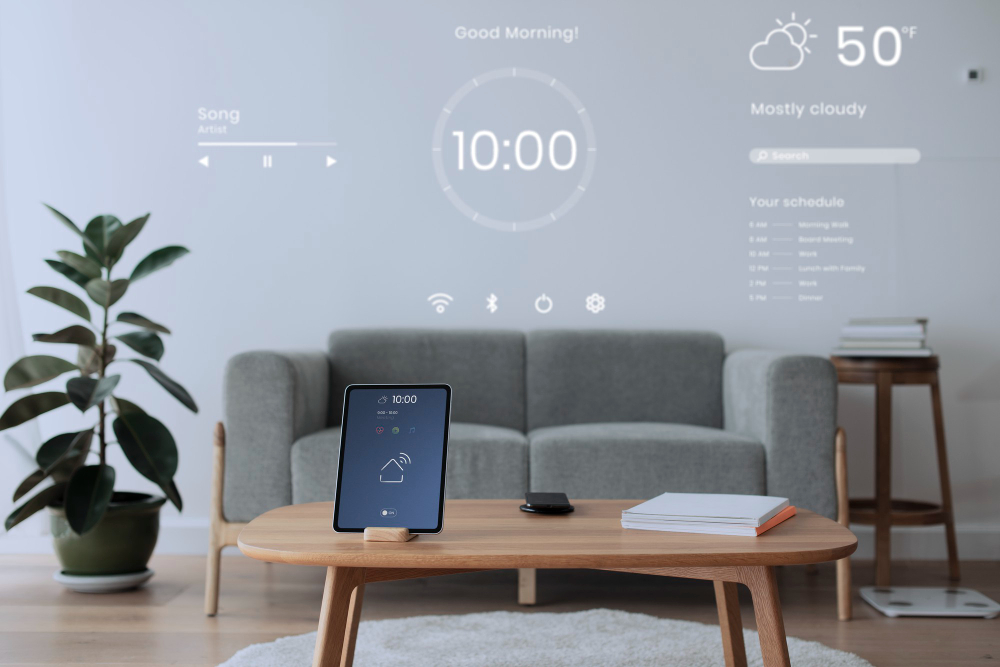
19th December, 2023
Homes are getting smarter as technology becomes further integrated into real estate. The smart home market has entered the mainstream, projected to grow steadily in the coming years. Home builders, buyers, and renters are recognizing the value of automated and connected household systems for security, efficiency, convenience and more. The rise of smart homes is transforming real estate.
Enhanced Safety and Security
One of the key appeals of smart home tech for property owners is beefed up safety and security measures. Web-connected video doorbells, security cameras, motion sensors, smart locks, and advanced alarm systems allow homeowners to monitor activity remotely and respond quicker to disturbances. High-tech firewalls and encryption also better protect against data and privacy breaches.
Greater Energy Efficiency
Sophisticated thermostats and appliances connected on the Internet of Things, along with smart lighting and automated shading, optimize energy use by self-adjusting settings based on room occupancy, outside weather, usage patterns and more. This convenience helps households cut electricity costs and reduces environmental footprints. EnergyStar certifies smart products in open plots in sadasivpet that drive efficiency.
Improved Property Value
Upgrading homes with smart appliances, lighting, A/V equipment, climate and security systems increases resale values substantially. This tech-savvy appeal allows owners to market higher asking prices and increases offer competitiveness. A 2022 survey says 77% of prospective home buyers now search for smart features and willingness to pay more for them.
Tech Giant Competition
Major tech corporations like Amazon, Apple, Google and Samsung all offer a growing variety of smart home platforms, ecosystems, gadgets and digital assistants for automated living. While conveniences abound, consumers must navigate fragmentation between proprietary brands, wireless protocols and data privacy policies. Emerging open standards for interoperability offer hope.
Voice Control and AI
Natural language voice interfaces make controlling various home systems and settings more intuitive and accessible via cloud-connected speakers and screens. Smart assistants like Alexa, Google Assistant and Siri can also pull data from across devices to make contextual recommendations and increasingly complex automation based on usage patterns and self-configured preferences, backed machine learning algorithms.
Remote Access and Management
Web and mobile apps for integrated smart home platforms give owners and even trusted guests secure remote oversight of a property's activities, systems and troubles. Thermostats, appliances, utilities, security feeds, automated routines and more can be monitored and tweaked from afar via smartphones for ultimate convenience. Some platforms even detect emerging issues and service needs.
New-Age Home Economics
The next frontier of smart home innovation aims to streamline domestic life through predictive profiles and unprecedented integration between traditionally separate systems like energy, appliances, entertainment and e-commerce. For instance, a smart fridge might track food depletion then automatically order groceries using preferences and budget allowances you preapproved from the convenience of an app.
The Smart Building Spectrum
Class A commercial structures see tech adoption first, but innovations eventually permeate down to residential settings. As 5G, AI, blockchain, drones, robots and autonomous EVs transform cities, our private abodes get smarter too. The lines between offices, communities and households digitally converge through clouds, platforms and networks in this dynamic smart revolution.
Are Smart Homes the Future?
While still an emerging niche catering to early tech adopters, smart homes are on pace for widespread normalization comparable to the proliferation of computers and smartphones. As convenience, security appeal and promised energy savings drive consumer demand, construction firms and real estate agents race to tech-enable listings to stay competitive in the market. For both buyers and sellers, smart capability may soon be a make-or-break feature.
Conclusion
As we delve into the future of smart living, Subhagruha Group Group introduces Sukrithi Pride, a pinnacle of technological integration within the serene landscapes of Sadasivpet. Spanning an expansive 65 acres, this venture offers plots starting from 183 sq yards, providing a canvas for your dream home. Sukrithi Pride boasts affordable pricing, making luxury living accessible. Offering not just a plot but a lifestyle, Sukrithi Pride seamlessly incorporates smart features, ensuring enhanced security, energy efficiency, and an elevated living experience. Embrace the future of real estate with Subhagruha Sukrithi Pride – where innovation meets tranquility.